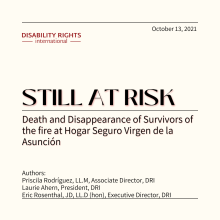Inter- American Commission on Human Rights hears testimony on abuse and torture case filed by DRI and Georgetown Law School’s O’Neil Institute
Washington, DC, July 2023 – The Inter-American Commission on Human Rights (IACHR), recently held a public hearing on a case filed against the Mexican government by Disability Rights International (DRI) and Georgetown University Law School’s O'Neill Institute, regarding the abuses and torture perpetrated against children and adults – most with developmental disabilities - who are confined indefinitely to the Casa Esperanza Institution in Mexico.


